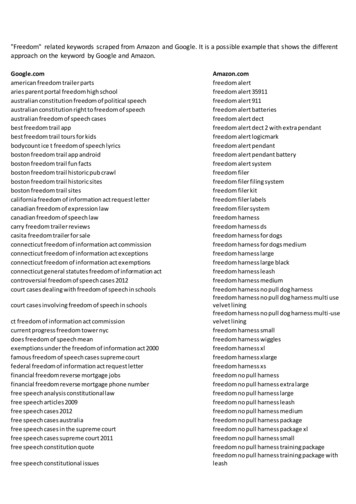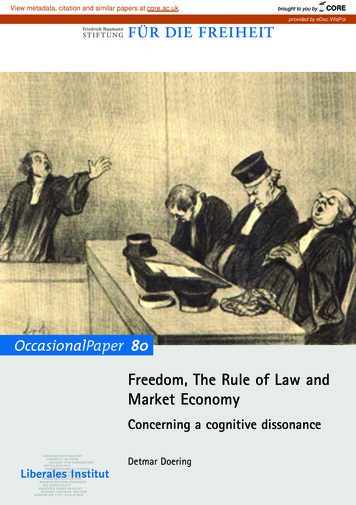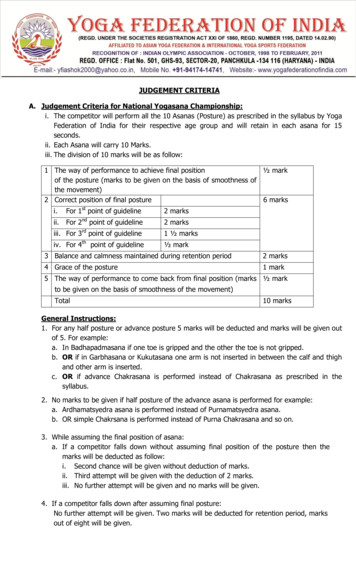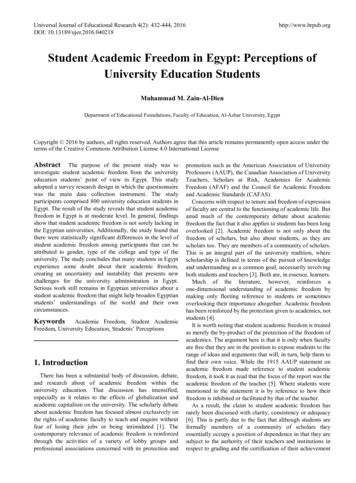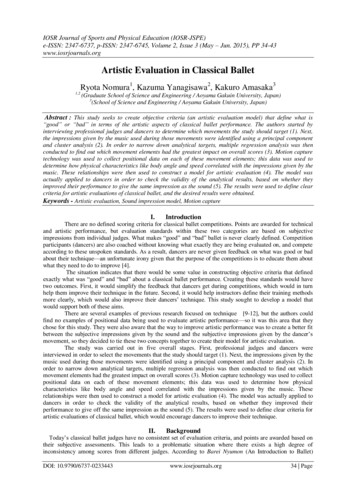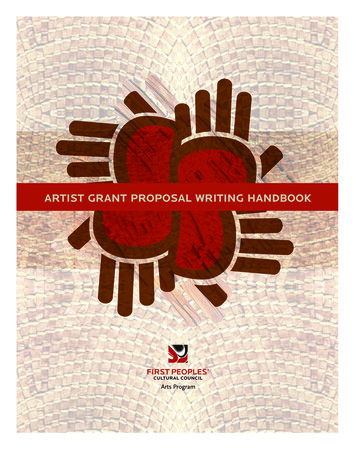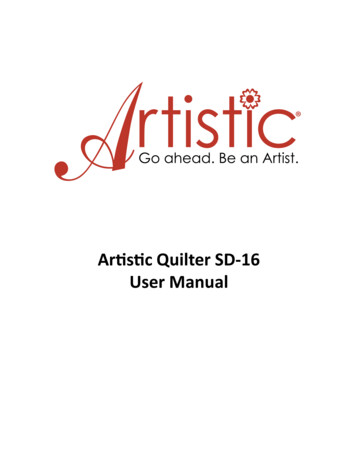
Transcription
THE STATE OF ARTISTIC FREEDOM 2020FREEMUSETHE STATE OF ARTISTIC FREEDOM 20201
Freemuse is an independent internationalorganisation advocating for and defendingfreedom of artistic expression.We believe that at the heart of violations of artistic freedomis the effort to silence opposing or less preferred views andvalues by those in power – politically, religiously or societally– mostly due to fear of their transformative effect. With thisassumption, we can address root causes rather than justsymptoms – if we hold violators accountable.Our approach to artistic freedom is human rights-based asit provides an international legal framework and lays out theprinciples of accountability, equality and non-discrimination,and participation. 2020 Freemuse. All rights reserved.Design and illustration: www.NickPurserDesign.comEditor: Dr Srirak PlipatFreemuse thanks those who spoke to us for this report, especially the artistswho took risks to take part in this research. We also thank everyone whostands up for the human right to artistic freedom.Every effort has been made to verify the accuracy of the information containedin this report. All information was believed to be correct as of March 2020.Nevertheless, Freemuse cannot accept responsibility for the consequencesof its use for other purposes or in other contexts.This report is kindly supported by the Swedish International DevelopmentCooperation Agency (Sida), the Norwegian Ministry of Foreign Affairs andFritt Ord Norway.
THE STATE OF ARTISTIC FREEDOM 2020FREEMUSE
“Today, perhaps all of us wonderwhether a trigger pulled, a steeringwheel turned, or a pin tugged by thefingers of some violent extremist willstrike down our future prematurely.But the actions of violent extremistscannot totally obliterate our world.Only governments can do that—andthis is the greater tragedy of today.Left on their current course, it willbe governments who will breakhumanity. Terrorists may attack us,but the intellectual authors of thosecrimes will then often sit back andwatch as governments peel away athuman rights protections; watch,as our societies gradually unravel,with many setting course towardauthoritarianism and oppression—staging for us, not a century ofachievement and pride, but a centurythat is small, bitter and deprived, forthe vast majority of humans.UN HIGH COMMISSIONER FOR HUMAN RIGHTS ZEID RA’AD AL HUSSEIN, 2017.14”FREEMUSE
CONTENTSSUMMARY6CHAPTER 1: THE VISUAL STORY9CHAPTER 2: GLOBAL TRENDS27Nationalism grows at the cost of free expression30Religious values and institutionalisation35Limitations still imposed on LGBTI artistic expression41Suppressing artistic freedom on the grounds of ongoing and past conflicts45The restrictive environment for artistic expression online49Restrictive laws and policies limiting artistic freedom54CHAPTER 3: COUNTRIES OF 95ZIMBABWE98RECOMMENDATIONSENDNOTES101THE STATE OF ARTISTIC FREEDOM 20201075
SUMMARYThe State of Artistic Freedom 2020 report is a researchpublication produced annually by Freemuse throughthe analytical examination of relevant developmentsand documented violations to the right to freedomof artistic expression. It is essential that theseviolations are continuously exposed in order toreflect contemporary challenges and ensure thatstates are held accountable for their inadequacy toprotect and promote the right to artistic freedom.feelings. There are examples of both artists and theirworks being targeted for content which presentsissues related to religion. In addition, appropriationof religion for political gain is rife in various partsof the world where laws that criminalise blasphemyand insults to religion are used to impede the rightto freedom of artistic expression. Such laws also arealso in contradiction with international standards ofhuman rights.The State of Artistic Freedom 2020 report is basedon 711 incidents where this right was violated orin other ways restricted through national laws in93 countries. Freemuse utilises statistical data, aswell as qualitative interviews with artists to providepersonal stories and insights about the limitationsplaced on artistic freedom.The deepening of a discourse based on uninhibitednationalist, as well as populist, sentimentscontinue to pose a concerning challenge for artistswhere political leaders introduce new measuresto limit political dissent. Growing nationalismhas led to increasing intolerance, particularlytowards alternative narratives and vulnerablegroups such as LGBTI, women and migrants.Antiterrorism legislation continues to be used toundermine fundamental freedoms in the name ofstrengthening national security. Vague definitionsof what constitutes terrorism allow for governmentsto investigate artists on charges of “glorifying”terrorist organisations, as seen in Turkey and Spain.Freemuse has documented censorship as the mostcommon violation of artistic freedom. Artworksand artists are unduly censored at a global scaledue to their creative content, which is opposedby governments, political and religious groups,social media platforms or by private individuals.Artists around the world continue to face severeinfringements on their human right to freeexpression through detentions, threats, prosecutionsand imprisonments. The main motive for theseviolations was found to be political, which reflectsan increasing malcontent for artistic expressionaddressing political issues and a widespreaddeterioration of core democratic principles.Compelling patterns and trends evident inFreemuse’s ongoing monitoring and documentationare presented in this report. These trends resemblethe most prevailing restrictions on artistic freedomduring 2019 and are analysed through emblematiccase examples. They similarly provide a broaderinsight into the political landscapes that demonstrateserious disregard to international human rights law.Freemuse has identified LGBTI persons and theirartistic expressions as an area facing continuouspushback both when portrayed in artworks andwhen it comes to the artists’ own sexuality. Artworksare challenged with censorship in countrieswhich outlaw alleged “promotion of homosexualpropaganda”. With these laws, protection oftraditional family values and children is used as therationale for prohibiting LGBTI-themed artworks.Suppression of LGBTI expression has particularlybeen pushed at a governmental level with the growthof nationalism, including religious nationalism andfar-right groups, as seen in Brazil, Russia, Indiaand Hungary. At the same time, artists who areoutspoken about LGBTI rights experience threats ofviolence and harassment from people arguing thatthey are insulting religious sentiments.The report shows how governments continue toexercise censorship to avoid hurting religiousRecorded violations of artistic freedom haveillustrated how both past and ongoing conflicts6FREEMUSE
negatively impact on the right to freedom of artisticexpression. Armed conflicts and territorial disputesrestrict the ability for artists to visit certain territoriesand thus limit their opportunities to perform andshare their art. Further, evolving issues related tothe legacy of the conflicts in art have in some casesled to censorship part of a wider clampdown onexpression supportive of political oppositions.An increasing number of artworks and creativeexpressions shared on social media platforms arecensored. Serious concerns have been raised byhuman rights organisations regarding nationallaws that have been introduced to combat onlinehate speech. With a lack of definition of whatconstitutes hate speech, laws have made socialmedia companies such as Facebook responsible forremoving such content within a limited timeframe.Such laws have proven insufficient and difficult forcompanies to meet. Cases also show how Facebook’sown Community Standards—which outline contentprohibition—are often not correctly upheld andartworks are taken down. In addition, the anonymitythat online platforms can provide pave the way forartists receiving threats and intimidating messages.This represents another major challenge for artiststo express themselves freely without discrimination.States have introduced new laws and policies to theirnational legislations or illegitimately used alreadyexisting legal provisions as measures to stifledissent. Although freedom of artistic expression isoften guaranteed and protected through nationalconstitutions, authorities have found ways to useTHE STATE OF ARTISTIC FREEDOM 2020other provisions to silence artists. This can be seenthrough the prohibition of the use of state symbolsor the imposition of bans on cultural exchangeamong countries in conflict. Recorded cases ofviolations of freedom of artistic expression showhow governments and other authorities impede onartistic content in ways that critically fail to respecthuman rights. Artists are censored, attacked,harassed, detained, imprisoned, persecuted andkilled for their artistic expressions. Such incidentsset limiting examples for other artists and may resultin widespread fear and exercise of self-censorship.Freemuse lists 13 countries of particular concern:Brazil, China, Egypt, France, Indonesia, India, Iran,Lebanon, Nigeria, Russia, Turkey, the United Statesof America and Zimbabwe. These countries havebeen considered for the worrying violations anddevelopments documented in each of the countriesand analysed with regards to their human rightsresponsibilities. In addition, other countries arepresented throughout the report which exemplifyhow governments fail to respect freedom of artisticexpression at a global scale.In this report, Freemuse offers severalrecommendations aimed to combat impunityand create an enabling environment for artiststo exercise their right to freedom of expression.The recommendations highlight the need forstakeholders at different levels to sufficientlyaddress illegitimate legislation and policy measuresthat are inconsistent with international humanrights standards.7
“Private norms, which vary accordingto each company’s businessmodel and vague assertions ofcommunity interests, have createdunstable, unpredictable andunsafe environments for users andintensified government scrutiny.National laws are inappropriate forcompanies that seek common normsfor their geographically and culturallydiverse user base. But humanrights standards, if implementedtransparently and consistently withmeaningful user and civil societyinput, provide a framework forholding both States and companiesaccountable to users across nationalborders.”REPORT OF THE SPECIAL RAPPORTEUR ON THE PROMOTION AND PROTECTION OF THE RIGHT TO FREEDOMOF OPINION AND EXPRESSION, ANNUAL REPORT TO THE HUMAN RIGHTS COUNCIL, THIRTY-EIGHTH SESSION18 JUNE 6 JULY 2018, A/HRC/38/35, P. 428FREEMUSE
1CHAPTER 1: THE VISUAL STORYTHE STATE OF ARTISTIC FREEDOM 20209
VIOLATIONS OFARTISTIC FREEDOM IN2019: THE BIG PICTUREFREEMUSE REGISTERED 711 ACTS OF VIOLATIONS OF ARTISTIC FREEDOM IN 2019 IN 93COUNTRIES. THEY SHOW WIDESPREAD ATTACKS ON FREEDOM OF ARTISTIC EXPRESSIONAT A GLOBAL SCALE AS PRACTICES OF SILENCING ARTISTS’ VOICES CONTINUE.KILLED:9 ARTISTS KILLED IN 8 COUNTRIES(2 IN UGANDA AND 1 IN EACH OFCHILE, COLOMBIA, EL SALVADOR,IRAQ, MALI, RUSSIA AND USA)IMPRISONED:71 ARTISTS IMPRISONED IN 16COUNTRIESEl Salvador: César Canales, frontman of the thrashmetal band Apes of God, was killed during the band’s liveperformance in the municipality of Armenia. The suspectto the crime claimed that the attack was related to adiscussion before the concert.Iraq: Poet Alaa Mashzoub, who was known for his writingsabout political and religious taboos, was shot dead as hewas bicycling back to his family home in Karbala.Turkey: Deniz Avcı was sentenced to two years and twomonths in prison for insulting President Erdoğan. He did thisby sharing caricatures of the president on social media whichwere created by famous artists Sefer Selvi and Musa Kart.Egypt: Khaled Lotfy, founder of Egyptian publishinghouse Tanmia, was sentenced to five years in prison fordistributing the Arabic version of The Angel. The book,written by Israeli writer Uri Bar-Joseph, portrays the sonin-law of ex-President Nasser as a spy.10FREEMUSE
DETAINED:Cuba: Artist Luis Manuel Otero Alcántara was arrestedby Cuban police on the evening of the opening of the XIIIHavana Biennial, following a performance outside of hishome involving a footrace with American flags. This visualartist, vocal against Decree 349 which institutionalisedcensorship of independent art in Cuba, was arrested morethan a dozen times in 2019.85 ARTISTS DETAINED IN 27COUNTRIESPROSECUTED:23 ARTISTS PROSECUTED IN 13COUNTRIESEgypt: Author Alaa Al Aswany, who lives in the USA,has been sued by military prosecutors for insulting thepresident, armed forces and judiciary through his novelThe Republic, As If and columns he had written for DeutscheWelle Arabic.China: Authorities pressed charges of espionage againstChinese-Australian novelist Yang Hengjun, author of thenovel Fatal Weakness which deals with espionage betweenChina and the USA and has been published on the Internetin China.2864457ARTISTS PERSECUTED IN 20 COUNTRIESARTISTS THREATENED/HARASSED IN 22 COUNTRIESARTWORKS AND VENUES DESTROYED/DAMAGED IN 15 COUNTRIES2210ARTISTS RECEIVED TRAVEL BANS IN 11 COUNTRIESARTISTS ABDUCTED, 9 IN CHINA AND 1 IN ZIMBABWEARTISTS AND AUDIENCE MEMBERS ATTACKED IN 4 COUNTRIES4352ARTISTS SANCTIONED/FINED IN 2 COUNTRIESTHE STATE OF ARTISTIC FREEDOM 2020ACTS OF CENSORSHIP IN 73 COUNTRIES11
ART FORMSSILENCED IN 2019FREEMUSE RESEARCH DETERMINES THAT ARTISTS AND ARTISTIC FREEDOMDEFENDERS ARE SILENCED FOR EXPRESSING POLITICAL VIEWS, QUESTIONINGRELIGIOUS AND SOCIAL NORMS AND IN OTHER WAYS PUBLICLY PRESENTING OPINIONSWHICH OPPOSE DOMINANT NARRATIVES. THEY ARE INCREASINGLY TARGETED BYNATIONALIST POPULIST GOVERNMENTS DETERMINED TO SUPPRESS DISSENT.32% MUSIC225 DOCUMENTED CASES IN 59 COUNTRIESMusic remains the most frequently targeted art form with 6 musicians killed, 5 attacked, 2 abducted, andmore than 31 detained, facing legal prosecution and sentenced to prison terms.26% VISUAL ART185 DOCUMENTED CASES IN 51 COUNTRIESVisual art has increasingly become a target especially in the context of artworks tackling political issues ordeemed inappropriate from the perspective of public morals and religion.15% FILM107 DOCUMENTED CASES IN 31 COUNTRIESCensorship exercised against film remains on a similar scale as in previous years, with almost 50% of filmstargeted because of the political content they feature.12% THEATRE88 DOCUMENTED CASES IN 27 COUNTRIESTheatre is under the radar of judicial authorities with 11 artists sentenced to prison terms, including 7members of Peacock Generation in Myanmar who were subject to legal prosecutions before different localcourts for insulting the military and online defamation.11% LITERATURE77 DOCUMENTED CASES IN 27 COUNTRIESApart from books being banned for their political content, the trend of removing books from schools andlibraries for including stories about sexual orientation and gender identity has increased.MULTIPLE FORMS OF ARTDANCE22 DOCUMENTED CASES IN 5 COUNTRIES7 DOCUMENTED CASES IN 6 COUNTRIESIn 6 out of 7 registered cases, dancers were targeted on the grounds of alleged indecency, sometimesconnected with religion and sexual orientation.12FREEMUSE
ARTISTS IMPRISONEDIN 201971ARTISTS ARE KNOWN TO BEIMPRISONED IN 2019 IN16 RUSSIA2 artists were imprisoned in each of Algeria, Malawi and the United Kingdom1 artist was imprisoned in each of Brazil, France, Guinea, Indonesia, Nigeria and Saudi ArabiaGROUNDS FORIMPRISONMENT:IMPRISONED ARTISTSTHROUGH ART FORMS:IMPRISONMENT BYREGION:Criticising government policiesand practices 42%Counterterrorism 21%Religion 11%Indecency 8%Conflict 4%Music 46%Literature 20%Theatre 15%Film 11%Visual art 6%Dance 1%Europe 42%Middle East & North Africa 31%Asia & Pacific 20%Africa 6%North & South America 1%Myanmar: Seven members of Peacock Generation, a thangyat troupe (traditional theatrical group), weresentenced to prison terms varying from six months to one year on charges of insulting the military and onlinedefamation related to a performance and the streaming of which on Facebook.Iran: Two members of Iranian band Confess—Nikan “Siyanor” Khosravi and Arash “Chemical” Ilkhani— weresentenced to a combined 14.5 years in prison for their heavy metal music.Malawi: Singer Anderson “Mesho” Alfred Chipwaila and his producer Stephano Emmanuel were sentencedto two years and one year in prison respectively for releasing the song Mizikiti Ichoke which tackled theissues of Muslim and Adventist religions with sarcasm.THE STATE OF ARTISTIC FREEDOM 202013
ARTISTSDETAINEDIN 201956%85ARTISTSKNOWN TO BEDETAINED IN27 COUNTRIESOF ARTISTS WERE DETAINED FOR POLITICAL REASONSTOP 10 COUNTRIESKNOWN TO HAVEDETAINEDARTISTSIN 2019:28%TURKEYMALAYSIASAUDI ARABIACHINARUSSIABELARUSINDIAEGYPTVENEZUELACUBATHE RATIONALEFOR DETAININGARTISTS IN 2019:ARTISTSDETAINEDBY REGIONEUROPENORTH& SOUTHAMERICAGamboulaMIDDLEEAST &NORTHAFRICAASIA : Veronika Nikulshina of the Pussy Riot protest group was detained together with directors AlexeyYershov and Maxim Karnaukhov en route to attend the Golden Mask National Theatre Award. The trio wasnominated for an award in the experimental theatre category for their participation in the play Poe.Tri.Nikulshina was arrested a further two more times in 2019.Poland: Polish activist Elżbieta Podlesna was arrested on suspicion of offending religious sentimentsafter posters featuring an image of the Virgin Mary with her halo painted in the colours of the rainbow flagappeared in the city of Płock.14FREEMUSE
ARTISTSPROSECUTEDIN 201939%23ARTISTSKNOWN TO BEPROSECUTEDIN 13COUNTRIESOF PROSECUTED ARTISTS ARE RELATED TO MUSICTHE RATIONALEFOR PROSECUTINGARTISTS IN ECUTEDBY COUNTRY:ZIMBABWE (4)TURKEY (3)CANADA (2)CHINA (2)EGYPT (2)LEBANON (2)RUSSIA (2)ARTISTSPROSECUTEDBY REGIONEUROPE28%MIDDLEEAST &NORTHAFRICANORTH& SOUTHAMERICA16%8%ASIA &PACIFIC16%AFRICA32%Russia: Musician Viacheslav Eliseev (aka Vyacha) was accused of public calls for terrorist activities in theform of the assassination of the President of the Russian Federation because of the song he wrote, To Kill thePresident.Uganda: Writer Stella Nyanzi faced court charges of cyberbullying and offensive communication after shepublished a poem on Facebook referring to the reproductive system of Ugandan President Yoweri Museveni'smother.THE STATE OF ARTISTIC FREEDOM 202015
RELIGIONAFTER POLITICS AND INDECENCY, RELIGION COMES AS THE THIRD MOST FREQUENTRATIONALE FOR SILENCING ARTISTS IN DIFFERENT CORNERS OF THE GLOBE.REPRESENTATIVES OF DIFFERENT CHURCHES AND RELIGIOUS GROUPS OFTEN FILECOMPLAINTS OR PUBLICLY REQUEST BANS AGAINST ARTISTS ALLEGING THAT THEIRWORK OFFENDS RELIGIOUS SENTIMENTS.74%42%62%OF ATTACKS ONARTISTS ON RELIGIOUSGROUNDS WERE INTHE GLOBAL SOUTHOF CASES HAPPENEDIN IRAN, LEBANON,INDIA (COMBINED)OF VIOLATORS WEREGOVERNMENTSARTISTS WERE OPPRESSED:1 ARTIST WAS KILLED IN IRAQ10 ARTISTS WERE IMPRISONED IN EGYPT, IRAN, MALAWI, SAUDI ARABIA 7 DETAINED IN BANGLADESH,CHINA, INDIA AND POLAND4 ARTISTS WERE PROSECUTED IN ZIMBABWE11 ARTISTS WERE PERSECUTED IN IRAN, INDIA, LEBANON, RUSSIA AND USA10 ARTISTS WERE THREATENED/HARASSED IN GERMANY, INDIA, INDONESIA, LEBANON, PAKISTAN,PALESTINE, RUSSIA AND USA2 ARTISTS WERE ABDUCTED IN CHINA3 ARTISTS WERE GIVEN TRAVEL BANS IN IRAN, USA AND LEBANON3 ARTISTS WERE ATTACKED IN SAUDI ARABIAMIDDLE EAST &NORTH AFRICAATTACKS UNDERRELIGIOUSRATIONALES BYREGION:ARTISTSRESTRICTED IN THENAME OF RELIGION:ASIA & PACIFICNORTH &SOUTH SUALARTISTS25%8FILMMAKERS42%5ARTISTS OFTHE STAGE1DANCERPakistan: After two unidentified armed men threatened guitarist Imran Akhoond on the street, he stoppedperforming live concerts due to fear for his life. “’What you are doing is Haraam and against the spirit ofIslam,” he was told.Israel: A sculpture depicting Ronald McDonald as Jesus created by Finnish artist Jani Leinonen was removedfrom the Haifa Museum of Art after Christian protesters threatened to firebomb the building.16FREEMUSE
COUNTERTERRORISMARTISTS IN AT LEAST 8 COUNTRIES WERE ATTACKED, DETAINED, INVESTIGATED,PROSECUTED AND IMPRISONED AS A RESULT OF MISUSES OF ANTITERROR MEASURES.THIS IS AN ALARMING TREND WHICH INDICATES THAT SOME GOVERNMENTS, IN THEIREFFORTS TO ASSURE NATIONAL SECURITY, TEND TO UNLAWFULLY DEROGATE HUMANRIGHTS OF THEIR CITIZENS.COUNTRIES WHERECASES RELATED TOCOUNTERTERRORISMWERE REGISTERED:OF THE MISUSE OFCOUNTERTERRORISM SAYEMENOF THE CASES WERE AGAINSTARTISTS WITH MINORITYBACKGROUNDS52%36%OF THE CASES WEREAGAINST ARTISTS OPPOSINGGOVERNMENT POLICIES42%OF THE CASES WEREREGISTERED IN TURKEY69%OF ARTISTS AFFECTEDBY MISUSES OFCOUNTERTERRORISMMEASURES WEREMUSICIANS.(4 imprisoned, 10 detained, 2 prosecuted,2 persecuted, 1 travel ban, 1 censored)31%OF THE ALL CASES WEREREGISTERED IN SPAIN(14 imprisoned, 1 censored)FORMS PERSECUTION3Turkey: Actress Nazlı Masatçı was sentenced to one year and 6 months in prison on charges of “alienatingthe public from military service” for acting in a theatre adaptation of Russian author Nikolai Gogol’s shortstory The Overcoat in 2010.Russia: Consumer-protection agency Roskomnadzor blocked the music service Last.fm because it wasstreaming the Chechen artist Timur Mutsurayev’s song Paradise under the shadow of sabers which wasdeclared as an “extremist song” by the Tyumen Leninsky District Court in 2015.THE STATE OF ARTISTIC FREEDOM 202017
MINORITIESIN 2019, THE TREND OF TARGETING ARTISTS WITH MINORITY BACKGROUNDS ANDARTWORKS TACKLING MINORITY ISSUES CONTINUED TO PERMEATE PRIMARILY ACROSSCOUNTRIES IN THE GLOBAL NORTH.2ARTISTSWEREKILLED84%OF ATTACKSON ARTISTSWITH MINORITYBACKGROUNDS WEREREGISTERED IN THEGLOBAL NORTH2/3OF VIOLATIONSAGAINST ARTISTSWITH MINORITYBACKGROUNDS WEREREGISTERED IN TURKEYAND USA COMBINEDARTISTS WITHMINORITY BACKGROUNDSUNDER ATTACK:49% MUSIC(10 detained in Turkey, 3 persecuted inIran, Turkey, Montenegro, 1 killed in USA, 1imprisoned in China, 1 Prosecuted in Turkey)26% VISUAL ART(1 killed in Colombia, 1 detained in USA, 1imprisoned in Turkey)16% THEATRE(1 detained in China, 1 persecuted in Turkey,1 abducted in China)EUROPE47%37%OF ATTACKSON ARTISTSWITH MINORITYBACKGROUNDS WEREON THE GROUNDS OFCOUNTERTERRORISMVIOLATIONS AGAINSTARTISTS WITH MINORITYBACKGROUNDS BYREGIONMIDDLEEAST &NORTHAFRICANORTH& SOUTHAMERICA5%37%ASIA &PACIFIC9%AFRICA2%5% FILM5% LITERATURETurkey: In house raids, Turkish soldiers arrested 8 Kurdish singers in total on allegations of spreadingterrorist propaganda in the Viranşehir district of Urfa province by singing in Kurdish at weddings.Romania: The municipality of Timisoara in western Romania banned a form of ethno-pop music known asmanele–most commonly performed by Roma and other disadvantaged communities–from being aired inpublic on a pretext that it promotes bad habits, consumerism, crime and the objectification of women.Bosnia and Herzegovina: The Mayor of the Čapljina Municipality predominately populated by Croats deniedpermission for the local Muslim community to hold the Bayram concert in the playground of the elementaryschool in Domanović.18FREEMUSE
LGBTILGBTI ARTISTS AND ARTWORK ARE ATTACKED IN COUNTRIES THAT BOTHCRIMINALISE AND DO NOT CRIMINALISE HOMOSEXUALITY50% OF VIOLATIONSARE COMMITTED BYTHE GOVERNMENT35%OF VIOLATIONSIN 8 COUNTRIES65%OF VIOLATIONSIN 10 COUNTRIESCOUNTRIES WHERETHERE IS NO LAWCRIMINALISINGHOMOSEXUALITYATTACKS AGAINST LGBTIARTISTS AND ARTWORKSWERE REGISTERED IN:ART FORMSWHICH WEREVIOLATED:31%THEATRECOUNTRIES WHEREHOMOSEXUALITY ORITS PROMOTION ISCRMINALISEDRATIONALE FOR SILENCING 30%RELIGIONLGBTI EXPRESSIONSFILM17%30%POLITICS1 IMPRISONED - China4 PERSECUTED – USA, United Kingdom, Russia6 DETAINED - Venezuela, Poland, Sri Lanka3 THREATENED/HARASSED - Indonesia, USA,Lebanon, Kosovo36 CENSORED - USA, Brazil, United Kingdom,China, Russia, Indonesia, Samoa, Sweden, UnitedArab Emirates, Egypt46% NORTH & SOUTH AMERICA28% EUROPE19% ASIA & PACIFIC26%48% OF VIOLATIONSTOOK PLACE IN USA,RUSSIA, UNITED KINGDOM(COMBINED)LITERATURE15%VISUALARTS19% MIDDLE EAST & NORTH AFRICA2% AFRICA6%MUSIC4%MULTIPLEART FORMS2%DANCESri Lanka: After a group of monks complained, novelist Shakthika Sathkumara was arrested for insultingBuddhism in his short story which contained indirect references to homosexuality among the Buddhist clergy.Venezuela: The Venezuelan police arrested four artists involved in the production of an LGBTI-themedtheatre play Two Cops in Trouble, accusing them of usurping a public function when pretending to present atheatrical piece while wearing the police uniform.Brazil: The headquarters of the Porta dos Fundos, the Brazilian comedy troupe which produced the filmThe First Temptation of Christ which features the story of Jesus Christ in a gay relationship, was attacked byMolotov cocktail bombs.Lebanon: A complaint by the Maronite Catholic Eparchy of Jbeil resulted in the cancellation of the indie rockband Mashrou’ Leila’s concert at the Byblos International Festival. Church leaders claimed that the songs ofthis band (whose lead singer is openly gay) were blasphemous.USA: Alabama Public Television refused to air the 22nd season premiere episode of the TV series Arthur, ananimated television show for children, because it featured a wedding between two male characters.THE STATE OF ARTISTIC FREEDOM 202019
WOMENWOMEN ARTISTS AND ARTWORKS DEPICTING WOMEN OR TACKLING FEMINISMRELATED ISSUES REMAIN UNDER CONSTANT ATTACK. THEY ARE SUBJECT TOCENSORSHIP, HARASSMENT, THREATS AND SOMETIMES LEGAL PROSECUTION. WOMENARTISTS ALSO FACE DISCRIMINATORY TREATMENT, ESPECIALLY IN COUNTRIES WHICHIMPOSE LEGAL OBSTACLES ON THEIR PARTICIPATION IN CULTURAL SECTOR.3 WOMEN ARTISTS WERE IMPRISONED: EGYPT 2, IRAN 174%OF VIOLATIONS AGAINST WOMENARTISTS AND ARTWORKS RELATED TOWOMEN WERE ACTS OF CENSORSHIPSMAINVIOLATORS:GOVERNMENTAUTHORITIES 57%PRIVATEENTITIES 23%57%OF CASES AFFECTING VISUALARTISTS AND ARTWORKS20 VISUAL ARTISTS, 8 MUSICIANS,3 FILM ARTISTS, 2 RELATED TOTHEATRE, 1 WRITER, 1 DANCER.40%OF VIOLATIONS OFWOMEN’S ARTISTICFREEDOM ARE IN THEMIDDLE EAST & NORTHAFRICAEUROPE 20%, NORTH & SOUTHAMERICA 17%, ASIA & PACIFIC14%. SOCIAL MEDIA 6%AFRICA 3%MAINRATIONALESUSED TO SILENCEWOMEN ARTISTS:INDECENCY 55%RELIGION 25%Iran: Singer Negar Moazzam was charged for singing solo as part of a sightseeing tour in the historicalvillage of Abyaneh.Palestine: The Dean of the School of Arts at An-Najah National University stopped the Enheduanna playperformed by actress Ashtar Muallem, invoking customs and tradition. There was unrest in audience andbackstage because “the actress’ costume was not appropriate for the stage.”Kyrgyzstan: The Ministry of Culture ordered the removal of several exhibits found “provocative” from theexhibition Feminnale placed at the National Museum of Fine Arts in Bishkek. Among removed artworks wereJulie Savery’s nude performance and a female torso-shaped punching bag wearing lingerie by Zoya Falkova.20FREEMUSE
DIGITALCOMMUNITY STANDARDS INTRODUCED BY DIFFERENT SOCIAL MEDIA PLATFORMSREMAIN THE MAIN SOURCE OF CENSORSHIP IN THE DIGITAL SPACE. THEIR CRITERIAFOR REMOVING CONTENT ARE AT TIMES ARBITRARY AND INCONSISTENT WITHINTERNATIONAL HUMAN RIGHTS STANDARDS. AFTER THE CONTENT IS REMOVED, THEADEQUATE APPEALS PROCESS IS LACKING.57%23% EUROPE19% ASIA & PACIFIC10% MIDDLE EAST & NORTH AFRICA8% NORTH & SOUTH AMERICA4% AFRICAOF CASES WHICH OCCURRED IN THE DIGITAL SPACE,BLOCKING ARTISTS AND ARTWORKS WERE BY ANDFROM SOCIAL MEDIA PLATFORMS AND INTERNETPORTALS (INCLUDING FACEBOOK, INSTAGRAM,TWITTER, YOUTUBE, GOOGLE, TWITCH)BECAUSE OF THE ARTISTIC ACTIVITYONLINE, ARTISTS WERE:58% CENSORED19% THREATENED/HARASSED13% IMPRISONED6% DETAINED2% PERSECUTED2% PROSECUTEDMAINRATIONALES FORVIOLATIONS WERE:INDECENCY 37%POLITICS 22%ARTISTS FACING LEGAL PROSECUTION because of posts on social mediaIndonesia: Rock musician Ahmad Dhani Prasetyo was sentenced twice in 2019 because of his social mediaposts with political content—to two and a half years in total.Myanmar: Film director and a founder of the Myanmar Human Rights, Human Dignity International FilmFestival, Min Htin Ko Ko Gyi was sentenced to one year in prison because of Facebook posts critical of themilitary and the 2008 Constitution.Turkey: Cartoonist Cihan Demirci was charged with “insulting the president” through several cartoons andsatirical articles he had shared years ago on Facebook.Facebook as censorFacebook prohibited the Geneva Museum of Art and History from promoting exhibition Caesar and the Rhonewith images of two statues—a half-naked Venus of Arles and a nude, kneeling man.Facebook banned the Theatre Royal Plymouth from using a picture to advertise one of their shows because ithad three pictures of people showing “too much flesh”; one of a male torso, one of breasts covered by a braand one of a bottom.THE STATE OF ARTISTIC FREEDOM 202021
MUSIC225 MUSICIANS AND THEIR WORKS AREAFFECTED BY ILLEGITIMATE RESTRICTIONSOF ARTISTIC FREEDOM6 MUSICIANS WERE KILLED:2 IN UGANDA, AND ONE IN EACHOF EL SALVADOR, MALI,RUSSIA AND USAIS THE MOST FREQUENTLYATTACKED ARTISTIC FORMMALI:POET AND GRIOT NIAPPA WAS KILLEDBY TWO JIHADISTS AT HIS HOME IN THEMOPTI REGION. SINCE THE ARRIVAL OFJIHADISTS IN THIS AREA, GRIOT ACTIVITIESWERE BANNED, FORCING THEM INTOUNEMPLOYMENT OR EXILE.UGANDA:JERRY OKIRWOTH, A PART-TIME DJAND STUDENT, WAS KILLED BY A MOB AT ADANCE CLUB IN NEBBI DISTRICT, NORTHERNUGANDA BECAUSE HE WAS NOT PLAYINGTHEIR FAVOURITE SONGS.OTHER FORMS OF SUPPRESSION O
artistic freedom in 2019: the big picture freemuse registered 711 acts of violations of artistic freedom in 2019 in 93 countries. they show widespread attacks on freedom of artistic expression at a global scale as practices of silencing artists' voices continue. killed: 9 artists killed in 8 countries (2 in uganda and 1 in each of


